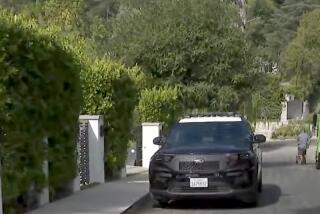To Stop a Thief
When Robert and Beverly Scott went out to dinner earlier this year, their conversation wasn’t entirely pleasant. Much of it concerned the rash of break-ins at their home in Shadow Hills, a rustic little community tucked away in the northeast corner of the San Fernando Valley.
In just two years, thieves had broken into a small warehouse at the rear of the two acres of land their home is on almost a dozen times and stole about $60,000 worth of supplies the Scotts needed for their vintage auto-parts business.
Yet no one had actually broken into their home-- until that very night.
“We got back from dinner, walked into the house, and the first thing we noticed was that someone had picked up the TV and turned it around so it faced the wall,” Beverly Scott said.
“The strange thing was, nothing was missing. I guess the crooks just wanted to let us know that they could get into the house anytime they wanted. We were frightened, and we were mad.”
Tired of being victimized, the Scotts hired a professional to install a complete alarm system in both their home and the small warehouse. They haven’t been ripped-off since--and any burglar who might try would soon be met by an armed security officer automatically summoned by the alarm.
With crime on the rise, it’s no surprise that homeowners like the Scotts are increasingly turning to professional alarm companies when it comes to protecting their home.
Not willing to entrust their security to a simple deadbolt lock or a do-it-yourself alarm kit, homeowners are paying hundreds or even thousands of dollars for high-tech systems that can protect an entire house with the mere push of a button.
“The technology has become so advanced, and competition so stiff, that just about anybody can buy a system today that only the rich could afford 10 years ago,” said Kirk MacDowell, a security expert and president of the Los Angeles County Burglar and Fire Alarm Assn.
Although it has helped to bring prices down, the growing number of alarm companies doing business today hasn’t been entirely beneficial for consumers. The state Department of Consumer Affairs has licensed 15,000 people to install alarms in California, and not all of them are reputable.
“We get hundreds of complaints about installers every year,” said Vickie Wilk, who mediates disputes between consumers and businesses for Consumer Affairs. “They run the gamut, from installers who didn’t finish their work to installers who actually steal.
“So, the first step toward getting a good security system is to find a good installer.”
Shopping for a professional installer is much like looking for a contractor to remodel your home. “Friends who are satisfied with their own alarm systems are usually your best sources of referrals,” said Phillip Sontag, a spokesman for Westec Security Inc., one of the Southland’s largest security companies.
“If your friend is happy with the system he bought, you’ll probably be happy with yours.”
Police are sometimes willing to provide recommendations too.
Once you’ve got the names of a half-dozen or so alarm companies, check each one out by contacting the Department of Consumer Affairs. You’ll find the nearest branch by looking under the “State Government Offices” heading at the front of the white pages.
“We can tell you whether the company is licensed to do business in California, and can tell you whether it has been disciplined for violating rules in the past,” said Gretchen Werry, who runs the state’s licensing program.
Also ask each installer if he or his company belongs to an alarm trade group. Although membership isn’t a guarantee that an installer will do a good job, it is an indication that the firm takes its reputation seriously.
The largest and perhaps most-respected group is the National Burglar and Fire Alarm Assn., which has local chapters across the country and is the parent of MacDowell’s Los Angeles organization.
“Our members have to adhere to our code of ethics, and we’ve got the power to investigate a company when a consumer files a complaint with us,” MacDowell said.
Plan to have representatives from at least three or four companies come out to make their security recommendations and offer bids.
Don’t be surprised if one installer makes a suggestion that another contradicts: They might have quite different ideas on how best to protect your house.
Most professionally installed security systems have three main components.
Sensors are the alarm’s eyes and ears. Perimeter sensors typically protect doors and windows, while interior sensors can tell whether someone is actually inside the house.
The central control unit is the system’s electronic brain. It tells you whether the alarm is turned on or off, and processes the information it gets from the sensors.
The alarm device is anything that alerts you or your neighbors when someone has broken into your home. Most alarms are sirens, although bright strobe lights that can attract attention or confuse a burglar are sometimes used.
Considering that the installer probably knows a lot more about making your home secure than you do, how do you keep from being suckered into buying a system with a lot of bells and whistles that you don’t really need?
“I’d call the local police department first, and see how most break-ins are occurring,” said Robert A. Bonifas, an official with the National Burglar and Fire Alarm Assn.
“If the police say that most of the burglaries in your area involve the breaking of windows, you’ll obviously want to make sure that your windows are protected.
“But if all those break-ins involved one-story homes and you’ve got a two-story house, you might not need to have sensors on all your top-floor windows.”
Security experts say that homeowners who have recently been burglarized are the ones most likely to “overbuy.”
“People get scared after they’ve been ripped off, and a lot of them want to turn their place into Ft. Knox,” said Sheila Blake, a spokeswoman for Honeywell Protection Services. “Those are the people who really have to fight the urge to buy everything the salesman offers.”
Most installers sell a basic package that includes a control panel, a few door or window contacts and a siren. Some also include motion and smoke detectors, although many companies charge extra for such items.
Each time the sales representative tries to sell you an extra gadget, make sure he explains why he thinks you need it.
If the explanation doesn’t make sense--or if you think you’d just be duplicating the protection provided by other parts of the system--decline the item and move on to other parts of the house.
Once you’ve figured out which security devices you need, have the installer provide a written estimate of the costs. The estimate should be meticulously itemized, listing each component you want to have installed.
Don’t be afraid to get overly detailed when it comes to the written estimate.
For example, have the installer write down where the main control panel will be placed: He might be basing his bid on the expectation that it’ll be put in your hallway, but you might want it in an out-of-the-way closet that will take a more complicated--and expensive--wiring job.
Also ask how long installation will take. Putting in a system can be a messy job, and you don’t want to spend several days with wire cables dangling from your ceiling or waiting for your installer to show up.
Take some time to think over the estimate, and don’t sign a contract on the spot.
Once you’ve settled on the system you want and the installer who will put it in, you’ll be faced with one more major question: Should you have your system monitored by a central security service?
It usually costs about $25 a month to have your system monitored. If your alarm goes off, your telephone will automatically call the service and the service will immediately try to call your house.
If you or someone else answers the phone and gives a secret password, the service knows that it was a false alarm and won’t do anything further. But if no one is there to give the password, the service will call police, the fire department or anyone else you have requested.
“I always recommend that people have their systems professionally monitored,” said security expert MacDowell. “You’ll hear the alarm go off if you’re at home in bed, but what if you’re at work or on vacation?”
Many professional installers run their own monitoring service. So don’t be surprised if you get a little pressure from the installer to sign up: After all, the monthly fees you pay will provide him with a steady source of future income.
Some installation companies allow you to select your own monitoring service. Others, including ADT and Honeywell, insist that you use their own.
Before you agree to have your system monitored, though, first ask to see the company’s central monitoring station.
“You want to see a neat, professional-looking operation that’s well-staffed,” said Honeywell’s Blake. “If the ‘central station’ is some guy who answers the phone from his kitchen, you’d better look for another company.”
Also ask if the monitoring service has been approved by Underwriters Laboratories, or contact the UL directly.
Representatives from the agency make unannounced visits to monitoring stations to make sure they’re upholding UL standards. They also make surprise inspections of the companies’ books to ensure that emergency calls are being answered promptly.
The UL is headquartered in Northbrook, Ill. The phone number of its West Coast office in Santa Clara is (408) 985-2400.
Consider, too, the station’s proximity to your home. If your telephone has to automatically dial extra numbers to ring the central station because it’s a long-distance call, the police or fire department will lose what could turn out to be a few precious seconds.
In addition, said security-expert Bonifas, some police departments will no longer respond to calls from monitoring stations that aren’t headquartered in the vicinity.
To show how important the station’s location can be, Bonifas tells the story of an old friend in New Mexico whose alarm was linked to a central station in New York.
“His alarm went off one day, and the station in New York called the police department in Albuquerque,” Bonifas said. “But because of the monitor’s New York accent and the fact that he couldn’t pronounce the (Spanish) name of the street, the police couldn’t respond to the call.”
You might not need professional monitoring if, say, you live in a closely knit neighborhood and you’re sure that someone will summon the police or fire department if your alarm system goes off. Of course, there’s no guarantee that your neighbors will be around to hear it, either.
As an alternative, you can purchase an “auto-dialer” that automatically calls authorities or anyone else you choose if the alarm is triggered.
However, check with your local police and fire departments before you put your trust in one of these gadgets: Some agencies will no longer respond to calls from auto-dialers because they’ve caused too many false alarms in the past.
Whether you get a professionally installed system or simply add a few deadbolts to your doors, the key to improving your home’s security is to use common sense and do whatever it takes to make you feel safe.
“Locksmiths, installers, the guy at the hardware store--we’re really all just selling you peace of mind,” Bonifas said. “Only you can decide what you need to get it.”
More to Read
Inside the business of entertainment
The Wide Shot brings you news, analysis and insights on everything from streaming wars to production — and what it all means for the future.
You may occasionally receive promotional content from the Los Angeles Times.










